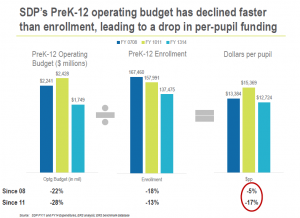Close the Gap, Grow the Economy
Pennsylvania can grow its economy by closing achievement gaps in its schools, according to a compelling new report released by the RAND Corporation.
The report teaches us three important things:
- Pennsylvania lost $1-$3 billion in earnings due to the achievement gap
- Pennsylvania could boost its economic output by $12-$44 billion by closing the achievement gap
- The state could save up to $5 billion in lifetime costs to society
Given the fact the majority of poor and minority students attend underfunded schools, the Pennsylvania Legislature could start to close the achievement gap by adopting a fair and adequate funding formula that takes into account factors such as poverty and English Language Learners. Join PCCY in Harrisburg throughout the month of June as we visit legislators and urge them to adopt a funding formula with this year’s budget. Click here to see the full list of action days.
Click here to read the RAND Report.
In Montgomery County, a Tale of Two School Districts
Norristown and Abington sit just 15 miles apart, but they are worlds away when it comes to the funding situation in their schools.
The Norristown School District may have to cut teachers from the high school’s art and music programs next year. Abington will not.
Norristown and Abington educate about the same number of students, but children in Abington have more offerings in high school than their peers in Norristown. Norristown schools offer 12 advanced placement courses. Abington offers 42.
Norristown educates far more students who live in poverty and English Language Learners than Abington and does so with about the same budget, even though it takes additional resources to educate poor and minority students (read more about the disparities between the districts here).
This is what disparity looks like and a funding formula based on the needs of schools will go a long way to closing Pennsylvania’s woeful spending gap between poor and affluent school districts.
PCCY and the Campaign for Education Funding is advocating for the state to fund our schools more equitably and erase the disparities students face based on where they live so students in Norristown can have the same opportunities as students in Abington. Click here to get involved.
The Math Doesn’t Look Good for Philadelphia Schools
The Philadelphia School District spends the least on educating children now than it has since 2008, a dark period that includes the layoffs of teachers, counselors and nurses and the closure of schools. The eye-opening new report from Massachusetts-based Education Resource Strategies finds that revenue the District receives from the City and State Legislature is not keeping up with rising fixed costs including compensation for teachers and payments to charter schools.
The District’s operating budget dropped 28% since 2011, while enrollment dropped 13%. Simple arithmetic shows how a declining budget leads to fewer dollars for educating children.
Remedying the situation starts with new recurring funding for schools. PCCY has a regular presence at City Council with parents and teachers urging Council to approve $105 million for schools. Click here to join PCCY in City Hall next Thursday to tell Council to once again step up and support Philadelphia schools.
Better Oversight Coming for Home-Based Child Care Providers
Pennsylvania’s Department of Human Services recommends three major actions to improve standards among home-based child care providers. In response to a federal audit that uncovered health and safety violations in private homes offering child care, DHS plans to strengthen the state’s licensing regulations, increase the number of random inspections and tie funding to enrollment in Keystone Stars.
Tracy Campanini, the acting deputy secretary in DHS said “One of the things that we’re doing as an initial step is that in order to receive some Child Care Works funding in the future, that programs need to be participating in Keystone Stars.”
Enrollment in Keystone Stars is a solid first step to improve oversight among home-based child care providers, but additional state funds are also needed to help providers raise the quality of care for children. The Pre-K for PA Campaign is working to expand access to high-quality early learning. Click here to get involved.

